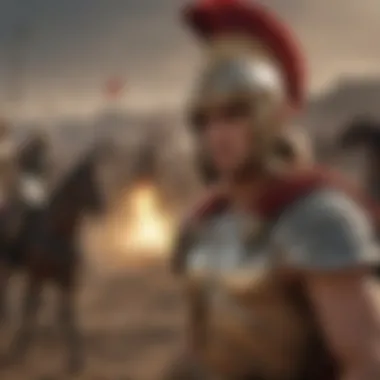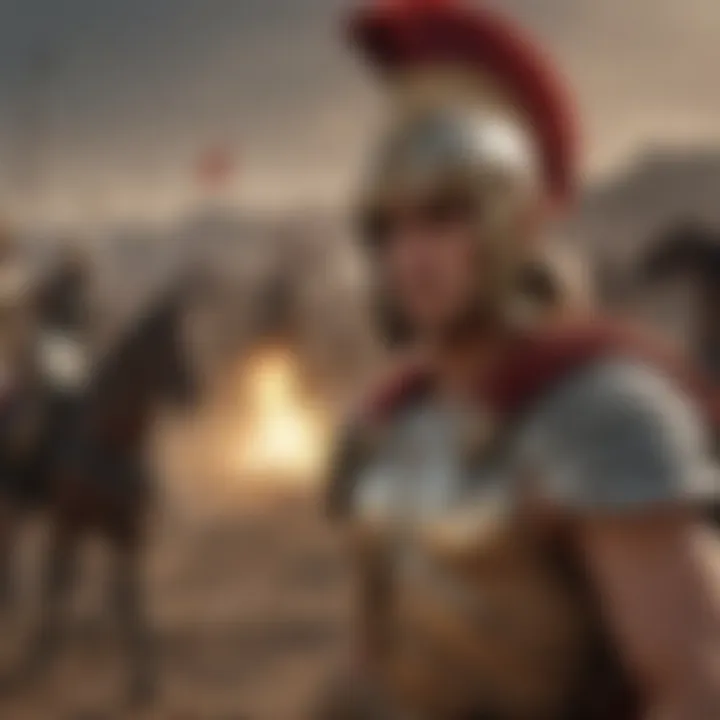Exploring the Legacy: Literature on Alexander the Great


Intro
Alexander the Great stands out as one of history's most notable figures, leaving an indelible mark on ancient civilization. The variety of literature documenting his life and conquests is extensive, encompassing perspectives that range from awe to analysis. Each book serves up a different aspect of Alexander's life—his military strategies, his quest for knowledge, his cultural impact, and his mythologized legacy.
This article delves into the wide array of works about Alexander. From detailed biographies to thematic studies, each section aims to provide a deeper understanding of this legendary figure. For scholars and enthusiasts alike, exploring these texts can yield insights not just about Alexander’s conquests but about enduring lessons in leadership, strategy, and influence.
As we journey through these varied narratives, we invite you to reflect on how Alexander shaped history and what that might mean for today's political and cultural landscapes.
Preamble to Alexander the Great
Understanding Alexander the Great requires more than surface-level knowledge. This section sets the stage by examining the historical backdrop of his life and conquests. He was a figure who wielded immense power, shaping not just his kingdom but influencing realms far beyond. In doing so, he presents a wealth of insights concerning leadership, military strategy, and cultural diffusion.
Historical Context
Born in 356 BC in Pella, Alexander's life coincides with significant upheaval in the ancient world. The backdrop of Macedonia's rise and the power struggles within Greece created a fertile ground for his ambitions. With the tutelage of Aristotle, a key philosopher of the time, Alexander developed a keen sense of governance and military tactics.
The Macedonian Empire's establishment under his father, King Philip II, created a path for Alexander. Events such as the unification of Greek city-states set the context that facilitated Alexander's campaigns. He inherited not just a kingdom but the aspirations to conquer the known world, marked by legendary battles and strategic advancements that remain pivotal in military studies to this day.
Importance in World History
Alexander's legacy is multifaceted. His campaigns against Persia led to the creation of one of the largest empires in history by the time of his death in 323 BC. He not only changed the geopolitical landscape but also ignited cultural exchanges that defined the Hellenistic Era.
The propagation of Greek culture throughout vast territories highlights his impact. Through the establishment of cities across his conquests, like Alexandria in Egypt, he enabled cultural syncretism, fostering environments where different traditions met and flourished. The infusion of ideas across various cultures cultivated innovations in science, philosophy, and the arts that have lasting resonance in contemporary society.
Biographies of Alexander the Great
Biographies of Alexander the Great play a crucial role in understanding the complex figure he was. These texts offer insight into not just his actions and decisions but also his personal values and relationships. They reveal how legends have shaped his image over centuries. Studying these biographies helps in unpacking the multiple interpretations of his life. This deep dive into his life serves to enrich our understanding of ancient history, leadership, and the prevailing cultural narratives.
Classical Biographies
Plutarch's 'Life of Alexander'
Plutarch's 'Life of Alexander' is among the earliest comprehensive accounts of the Macedonian ruler. This biography is notable for its focus on moral character and values. Plutarch's narrative provides a human portrayal of Alexander, showing his ambitions, flaws, and complexity.
Readers appreciate Plutarch for weaving anecdotes about Alexander with moral lessons, highlighting how personal attributes affect leadership. This emphasis on character may explain its widespread acclaim and continued relevance in educational settings.
One unique feature of 'Life of Alexander' is Plutarch’s ability to draw on various historical sources, albeit through a lens that favors moralizing over precise historical facts. While this can be an advantage for enriching the story, it also poses disadvantages by lending itself to bias and interpretative flexibility, especially in academic discussions.
Arrian's 'Anabasis of Alexander'
Arrian's 'Anabasis of Alexander' is valued for its military detail and analytical approach. Written in Roman times, it is considered one of the most authoritative sources on Alexander’s campaigns. Arrian frequently cites primary sources that purportedly discussed Alexander’s deeds, providing a foundation of ostensibly credible witness.
This focus on military structure and strategic formation offers compelling insights into Alexander's tactics and battlefield decisions. Its analytical nature has earned Arrian’s work praise among military historians and students alike.
A distinctive aspect of 'Anabasis' is its strategic examination of battles, which have resonated within military studies and planning. However, its strong emphasis on warfare means that other facets of Alexander’s life, such as cultural ramifications and personal relationships, receive less scrutiny, potentially leading to a myopic view of his legacy.
Modern Biographies
Robin Lane Fox's 'Alexander the Great'
Robin Lane Fox’s 'Alexander the Great' represents modern historical analysis combined with narrative style. This biography places Alexander within the context of Greek and Macedonian culture, offering a balanced view of his innovations and errors alike. Lane Fox takes into account recent archaeological findings, enhancing the discussion surrounding Alexander’s campaigns and their significance in history.
The engaging prose is a standout characteristic, making complicated ideas accessible while retaining analytical depth. This aspect makes it a popular choice among casual readers and scholars. Moreover, its rootedness in contemporary research limits reliance on dated sources, offering a refreshingly updated perspective on Alexander.


Nonetheless, some might argue that the narrative flair may obscure specific details and academic rigor. The balance between storytelling and analysis could appeal more to general readers while potentially alienating those seeking strict historical documentation.
Philip Freeman's 'Alexander the Great'
Philip Freeman’s 'Alexander the Great' also contributes to a modern understanding of this historical figure, focusing on cultural influences and personal choices that shaped Alexander’s life and goals. Freeman examines not only events but also Alexander's impact on the regions he conquered. Critics often cite Freeman’s accessible writing style, making extensive research approachable to an uninformed audience.
This biography makes advantageous connections between historical context and social dynamics, thus enhancing the narrative surrounding Alexander’s role in world history. A notable feature is its inclusion of vibrant anecdotes that entertain while providing substance. However, some evaluators feel Artistic embellishments may detract from factual rigor. This challenge is often present in storytelling about well-known historical figures where one risks losing adherence to core truths in favor of engaging narratives.
In summary, the biographies of Alexander the Great provide layers of understanding that contribute significantly to our comprehension of his life. By analyzing classical and modern interpretations, readers can appreciate the evolving narratives that surround one of history's most complex figures.
Thematic Studies
Thematic studies are significant in understanding the legacy of Alexander the Great. They provide insights that transcend the specific events of Alexander's life. By analyzing broad themes such as leadership, strategy, and cultural impact, scholars can show how he influenced ancient and contemporary worlds. These factors allow for a deeper appreciation of not just his military prowess but alsohis cultural integrations and philosophical implications.
Leadership and Strategy
Lessons from Alexander's campaigns
One of the key aspects of studying Alexander's campaigns is their innovative nature. His strategic decisions often defied contemporary norms. This particularly shows through his flexible tactics and battlefield innovations. His adaptability in various environments marks him as a military genius. This subject matters since it offers readers real lessons about strategic thinking related to various fields today. Teachers, business leaders, and military strategists alike find relevance in these lessons.
The unique feature of focusing on this topic is identifying specific tactics that led to decisive victories. However, one downside may be overgeneralizing his strategies. What works in the context of ancient warfare may not apply in modern scenarios. Nevertheless, these lessons serve as exemplary learning points for any interested party.
The role of leadership in conquests
The ability of Alexander to unite diverse forces under his command exemplifies relevant leadership qualities. A crucial element to focus on is his capacity to inspire those around him, illustrating his exceptional leadership attributes. Leadership is not purely about authority but also involves motivating and maintaining unity. This idea reiterates the importance of character in leading successful campaigns.
An advantageous aspect of exploring this theme involves examining how strong leadership can lead to effective coalition-building. A challenging part of this exploration is discerning the reasons why some leaders fail to replicate Alexander’s success. Those engaged in organizational behavior or team management can benefit from effective study compounding this concept.
Cultural Impact
The Hellenistic Era and cultural diffusion
The dissemination of Greek culture during the Hellenistic Era remains one of Alexander's lasting contributions. He not only conquered lands but also facilitated profound cultural exchanges. The unique blend of cultures had long-lasting effects, shaping future civilizations. This combination shows relevance today as we study globalization in contemporary contexts.
An advantage of discussing cultural diffusion involves portraying how ideas and traditions intermix positively. It enables readers to reflect on cultural forms today that trace back to these cross-cultural interactions. However, this also risks romanticizing imperialism through the lens of well-intentioned influence, which complicates narrative and ethical debates surrounding colonialism.
Alexander as a cultural icon
Alexander's representation in various forms stands as an indicator of his significant cultural marks on humankind. He appears variously across books, films, and art, often embodying traits seen as heroic or aspirational. The character's symbolization is grounded in perseverance and determination, revered even centuries after his time.
This representation provided intriguing aspects of popular culture by allowing people to explore themes of ambition and human potential. Though engaging, an important consideration is how popular interpretations can often oversimplify or misrepresent the complexities of historical figures. Understanding Alexander's depiction can lead to misconceptions unless contextualized within historical facts.
Understanding Alexander the Great's character helps identify how individuals reflect their societies and aspirations through literature.
Military Strategies
Military strategies are fundamental to understanding the achievements and tactics of Alexander the Great. His conquests were not solely reliant on brute force; rather, they showcased a fusion of innovative thinking and adaptation. By analyzing these strategies, readers can appreciate how Alexander secured his victories and maintained his empire. This section offers insight into the nuances of his military techniques, focusing on both tactics and case studies.
Tactical Innovations
Use of cavalry
Cavalry played a significant role in Alexander’s military successes. Essentially, he utilized cavalry as a rapid strike force that complemented infantry in mobilization and combat. The Macedonian cavalry, characteristically, was highly mobile and versatile. This type of force was beneficial in various scenarios, such as pursuing fleeing enemies or disrupting enemy formations.
One unique aspect of cavalry during Alexander's campaigns was the winged cavalry formations, which allowed for flanking strategies that confounded opponents.


The advantages included speed and maneuverability, enabling quick attacks on enemy flanks. However, they also risked becoming disorganized without firm infantry support.
Siege tactics
Siege tactics, another critical element of military strategy, were paramount for Alexander when faced with fortified cities. Alexander understood the necessity to adapt siege approaches based on enemy defenses. Known for leveraging engineering innovations, he utilized siege engines and other methods to effectively breach city walls.
A characteristic of these tactics was the incorporation of psychological warfare which disrupted the morale of the defenders. His ability to measure the city’s weaknesses often made it easier for him to force surrenders.
The advantage here was that he could draw upon multiple tactics within the same siege scenarios. Disadvantages did manifest, such as extended siege durations leading to possible supply shortages or attrition among his troops.
Case Studies of Key Battles
Battle of Gaugamela
The Battle of Gaugamela stands as one of Alexander’s pivotal victories and underscored where strategic prowess showed the most. Taking place in 331 BC, it was a turning point against the Persian Empire. One notable characteristic was the terrain's role; Alexander chose the battleground strategically, opting for a relative flatness that favored mobile forces.
This battle symbolizes the effectiveness of combined arms. His use of cavalry alongside phalanx infantry formed a devastating pincer movement, confusing Darius III and his significantly larger forces.
The unique feature of Gaugamela was how crisp formation and precise timing under pressure gave Alexander an edge. Effective command allowed for a relatively smaller army to overcome vast numbers with clarity.
Battle of Hydaspes
The Battle of Hydaspes, fought in 326 BC, is crucial for understanding Alexander's military adaptability. This battle was unique as it faced not only another skilled army but the challenging terrain of the Indian River. Alexander's forces showed great resilience and creativity in the face of potential disaster.
The critical characteristics speak to his flexibility in utilizing local tactics combined with previously established approach strategies. Alexander paid attention to the enemy’s use of war elephants and adapted by creating specific counter-elements within his army.
Its primary advantage was the combined tactics used during battles on both field and water, proving that resourcefulness can triumph. However, the significant reliance on local intelligence presented challenges in maintaining momentum in foreign terrain.
Alexander's battles reveal not just confrontations, but his capacity to blend strategic foresight with adaptability in various contexts.
Through these insights gained from analyzing cavalry usage, siege tactics, and key battles like Gaugamela and Hydaspes, readers can understand that critical elements of Alexander’s military strategies were advanced for their time and surprising outside conventional tactics. These considerations enable readers to keep an eye closer on how individualized military decisions created substantial impacts during his extraordinary journeys.
Philosophical Perspectives
The philosophical aspects surrounding Alexander the Great provide a deeper understanding of his leadership and actions. Exploring these dimensions gives insight into how his thoughts and ideas influenced not just his reign but also the hearts and minds of thinkers that came after him. This section delves into his relationship with Aristotle and examines the notion of heroism in the context of his life.
Influence of Aristotle
Aristotle was a profound influence on Alexander. As his tutor, Aristotle instilled in him a thirst for knowledge and a sense of ethics that shaped his worldview. Alexander was exposed to various fields including philosophy, science, and politics, which played a significant role in cultivating his leadership style.
Aristotle taught Alexander about virtuous leadership: that a ruler must possess not just power but also wisdom. The teachings encourages Alexander to seek knowledge as the foundation for his empire ambitions. This intellectual upbringing helps people to understand why he often sought advice from sages during his campaigns, showing a strong preference for counsel.
Historically, this relationship has led some scholars to argue that Alexander's fusion of duty and ambition reflects a direct line from Aristotle’s ethical views. Thus, recognizing the precursors to Alexander’s actions allows observers to better articulate what he projected during his conquests.
Concept of Heroism
The concept of heroism in relation to Alexander the Great is multifaceted. On one hand, many view him as the archetypal hero, a figure who reputedly conquered vast territories and inspired generations. His courage and charisma are celebrated. Yet, there is a contrasting viewpoint. Where his ambition and actions led to countless deaths, some depict him as a tyrant cloaked in the garments of sufficient bravery.
Alexander's portrayal varies from the hero in folklore to a ruthless leader due to the complexities of his military campaigns. This is significant when examining literature themed around him. Academic debates continue regarding whether or not his actions aligned with a hero's ethical stand. Such discussions question, "Is the ability to conquer an indicator of heroism or madness?"
Ultimately, understanding these philosophical perspectives helps shape the narrative of Alexander's legacy positively and negatively. Scholars benefit significantly from considering how these views impact interpretations across different cultures.
Debates and Controversies
The topic of debates and controversies surrounding Alexander the Great is crucial. These discussions reveal disparate perspectives, deepening our understanding of his life and legacy. They highlight how history is often told through varying lenses, influenced by the cultural and social contexts of its narrators. Conceptualizing Alexander’s life is complicated as the lines between fact and legend blur. Evaluating the implications of these narratives offers us useful insights, helping to reconcile or challenge established historical views.


Historical Accuracy vs.
Myth
The question of historical accuracy in the portrayal of Alexander the Great has long stirred debates among scholars. Many acknowledge that his conquests and deeds have been shaped by later interpretations. Plutarch and Arrian, while invaluable, present viewpoints that often mix historical truths with embellishments. This intertwining challenging winning genuine perspective of his life.
Several key factors complicate this issue:
- Filters of Time: Eyewitness accounts have been lost or transformed over centuries.
- Cultural Influences: Different eras have different priorities, impacting recounting of facts.
- Heroification: Alexander is often portrayed as a perfect leader, which can neglect critical viewpoints.
- Propaganda: Use of myths served political purposes, presenting him as greater than mere mortal.
Acknowledging the shift in narratives allows for more nuanced interpretations and reduces the bias inherent in historical texts.
Exploring the implications of these inaccuracies can enrich research, helping uncover longstanding assumptions about military strategies, relationships, and achievements.
Alexander’s Legacy: Hero or Tyrant?
The debate over whether Alexander the Great was a hero or a tyrant encapsulates the complexities of his legacy. Views on him diverge sharply based on cultural, academic, and ideological lines. some highlight his unparalleled conquests and visionary aspirations, celebrating the spread of Hellenistic culture and ideas. These elements position him as a hero in the commendation of unity and advancement during tumultuous times.
Conversely, there are considerations for those who see him as a tyrant. His military tactics included extreme measures, leading to civilian casualties and coerced assimilations. Critics point to massacres and enslaving populations as defining features of his conquests.
Several aspects contribute to this debate:
- Cultural Imperialism: Establishing Greek culture across regions was often viewed as an imposing act.
- Conquests and Relaxations: His campaigns bore heavy tolls on numerous societies and landscapes.
- Personal Ambitions: Devotion to personal glory overshadows humanitarian concerns in several contexts.
This dichotomy provokes essential discussions, fostering critical queries that sharpen students’ and scholars’ understandings of power dynamics, legacy assignment, and the paths that history elects for its figures.
Alexander in Literature and Popular Culture
The figure of Alexander the Great transcends history to find a place in literature and popular culture. This section examines how different forms of artistic interpretation shape our understanding of this complex character. Through literature and various media portrayals, the narrative of Alexander gains new dimensions, sparking expansive curiosity and promoting diverse interpretations.
Literary Representations
Shakespeare's 'Henry '
Shakespeare's of 'Henry V' is not typically associated with Alexander the Great directly; however, it embodies themes of leadership and warfare, resonating with Alexander's narrative. Alexander is often considered in discussions of what it means to be a ruler and a warrior. The character of Henry approaches aspects of heroism, akin to those assigned to Alexander. The key characteristic of Leaders shown in 'Henry V' captures the idealism and strategy similar to Alexander’s military endeavors.
This play becomes a useful reference point because of its merit in harnessing the morals of ambition, courage, and statecraft. Readers can draw connections between Henry’s portrayal and Alexander’s historical character from ancient texts, enriching the discourse surrounding both figures.
One unique feature of 'Henry V' is the depiction of the personal struggles faced by a monarch. This offers valuable insights when acknowledging the burden leaders like Alexander must endur. It makes this resource both insightful and relatable.
Novels and historical fiction
Fictional accounts regarding Alexander the Great greatly contribute to popular images of his character. Novels within the historical fiction genre are particularly impactful as they present imaginative retellings of Alexander's ventures. A prominent example includes
Finale
Summarizing Alexander's Impact
In reviewing the extensive literature on Alexander the Great, one recognizes a complex genius that shaped the courses of various domains, including politics and culture. Many texts elucidate how his military conquests created one of the largest empires in history, spanning three continents. Consequently, he not only influenced geopolitics yet also established cities, such as Alexandria, which became cultural hubs. Such sources allow readers to grasp the magnitude of Alexander's endeavors.
Several historians highlight distinct facets of his legacy. For instance, Robin Lane Fox's engaging narrative underscores both innovative strategies and relentless ambition in shaping Alexander's character. Similarly, Arrian offers profound insight into the objectives driving Alexander's campaigns and their implications on future rulers. Thus, the wide range of perspectives on Alexander contributes significantly toward understanding his expansive impact.
Continuing Relevance
The relevance of Alexander the Great resonates strongly today. Modern decision-makers and leaders often look back to his exploits for inspiration. Numerous studies indicate that the effectiveness of leadership during uncertain times mirrors Alexander's adaptive strategies during his extensive campaigns. These practical lessons continue to be applicable in both military and corporate landscapes.
Lastly, ongoing scholarly debates about the duality of Alexander's nature as either a hero or a tyrant provoke thought and draw parallels to today's political figures. The ongoing analysis ensures his legacy remains not only a subject of historical investigation but also contextualizes present-day leadership philosophy.
Thus, as new generations examine these stirring narratives, Alexander's life remains an insightful flashlight, helping comprehend historical dynamics and its enduring implications.
“The mind does not command the body. It shapes it and earns its obedience.” - Friedrich Nietzsche







